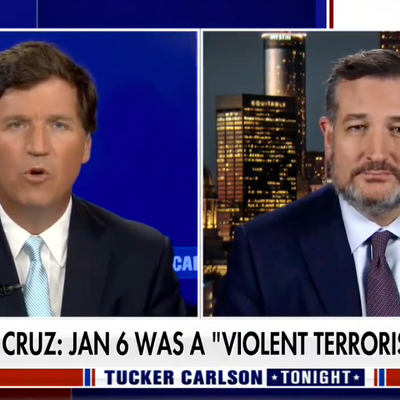
Senator Ted Cruz has tried to cling to what has become the safest ground in the Republican Party: Denouncing the violent attack on the Capitol one year ago without criticizing either the lies that inspired it or acknowledging their growing hold over the GOP. It was a “dark day” when a few bad people decided to beat up cops for ephemeral reasons, to no effect.
But Cruz made a crucial error. In denouncing the people who attacked Capitol police, he employed his customary term: “terrorists.” It has been one of his favorite words of abuse, generally reserved for domestic criminals. But Tucker Carlson objected to Cruz deploying the epithet against right-wing insurrectionists. (He also objects to the term “insurrectionists.”) And so Cruz, in what has become a Trump-era ritual, pleaded for the chance to trade one of his remaining scraps of dignity in return for a measure of forgiveness.
“As a result of my sloppy phrasing, it’s caused a lot of people to misunderstand what I meant,” Cruz begged. “What I was referring to was the limited number of people who engaged in violent attacks against police officers.”
Cruz and Carlson disagreed over whether it was accurate to describe people who assault police as “terrorists.” (The FBI defines domestic terrorism as “violent, criminal acts committed by individuals and/or groups to further ideological goals stemming from domestic influences, such as those of a political, religious, social, racial, or environmental nature,” which would seem to include assaulting police officers in order to further the ideological goal of giving Donald Trump an unelected second term.)
Cruz did not back down on the broader definitional claim that attacking police officers is “terrorism.” He conceded, however, that it was wrong to describe Trump fans who attacked police officers this way. “The reason I used that word is that’s the word I’ve always used for people that attack cops,” he pleaded, “But in this context, I get why people are angry. Because we’ve had a year of the corrupt corporate media and Democrats have so politicized it.”
Calling right-wing extremists who attacked cops in hopes they could pressure Congress to cancel the results of the election “terrorists,” Cruz now agrees, was a horrendous slur. Whatever these people are, they are not as bad as people who attack police officers for other, less sympathetic reasons.
Cruz also noted that, while he erred by describing the violent attackers in the insurrection as “terrorists,” he would never describe their effort to overthrow the government as an “insurrection.” “Saying it’s an insurrection is a political term,” he noted. “It’s a lie, I’ve repeatedly denounced it.”
Cruz ended the segment by reminding Carlson he was one of a dozen senators who supported Trump’s effort to cancel the election results. “While thousands of people were standing up to defend this country on January 6,” he said, “I was standing on the Senate floor, objecting to the election results.”
Cruz thought the sweet spot for him was to position himself as a champion of Trump’s nonviolent efforts to discard the election results while strongly condemning its violent aspects. Not for the first time, and probably not for the last, he misjudged the political market.






























